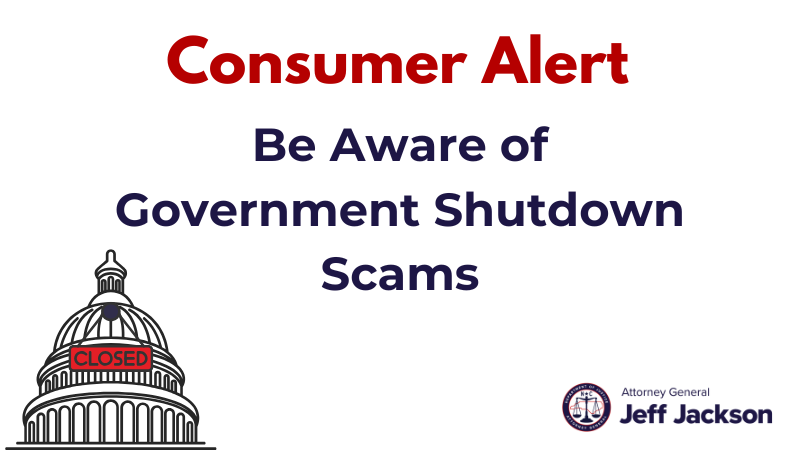Attorney General Jeff Jackson Warns North Carolinians of Government Shutdown Scams

For Immediate Release
Friday, October 3, 2025
Contact: nahmed@ncdoj.gov
919-538-2809
RALEIGH – Attorney General Jeff Jackson is warning North Carolinians to be on alert for potential scams while the federal government remains shut down. Scammers use government shutdowns as an opportunity to impersonate federal agencies and steal personal or financial information. They are seizing on the uncertainty and worry that accompanies a government shutdown. This is a stressful time, but please be watchful for signs of a scam that could make an already difficult time much harder.
“In a shutdown, scammers see an opportunity to try to take advantage of people,” said Attorney General Jeff Jackson. “Don’t let them. Know what the signs of a scam are and report them to my office if you think you see one.”
You may receive a call, text, or email from someone impersonating government agencies claiming that your benefits are at risk unless you provide personal information or make a payment. In past shutdowns, scammers have pretended to be from the Social Security Administration, Medicare, or the Supplemental Nutrition Assistance Program.
Here’s what you need to remember:
- Government agencies will not request personal information through email, over the phone, or by text; will never demand money through email, over the phone, or by text; and will not ask for or take payment by prepaid gift card, wire transfer, cryptocurrency, or a pay app.
- Don’t answer calls from phone numbers you don’t recognize.
- Never give your bank account, credit card, or Social Security number to someone you don’t know over the phone. Instead, hang up and call the government agency directly to figure out whether they actually reached out to you – and remember that in a shutdown, wait times might be longer.
- Be suspicious of offers of loans or payments because of the shutdown. Even if it’s not a scam, it will probably come with too many strings attached.
- Don’t believe threats of arrests, lawsuits, or fines from people claiming to be from the IRS, law enforcement, or another government agency. No one from a government agency will contact you by text, phone, or email to threaten you with arrest.
- Never wire or send money in response to a phone call, text, email, or online message. Once the money has been sent to a fraudster, it’s almost impossible to get it back.
During the shutdown, the Federal Trade Commission’s national Do Not Call registry and consumer complaint submission system are offline, so consumers can’t report unwanted, suspicious, or illegal robocalls or telemarketing calls.
Here’s how you can protect yourself during the shutdown:
- File a complaint with the NCDOJ’s Consumer Protection Division at ncdoj.gov/complaint or 1-877-5-NO-SCAM. You can file a complaint with our office even when the Do Not Call registry is back online. Our office will send complaints to the federal database when the FTC reopens.
- Call your cellphone provider and ask if they have a spam call-blocking app or service that can block unwanted calls. All providers should have a version of this service available at no additional charge to you.
- If the call appears to come from Canada or mentions Canada, also contact Operation PhoneBusters, the Canadian telemarketing fraud task force, at (888) 495-8501.
###
Legal Disclaimer:
EIN Presswire provides this news content "as is" without warranty of any kind. We do not accept any responsibility or liability for the accuracy, content, images, videos, licenses, completeness, legality, or reliability of the information contained in this article. If you have any complaints or copyright issues related to this article, kindly contact the author above.
